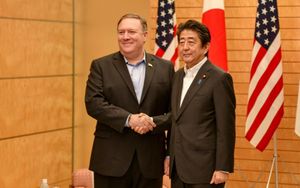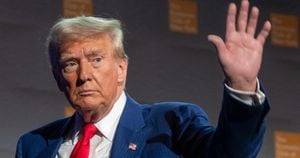The fallout from the recent U.S. presidential election is echoing far beyond American shores, particularly across the tumultuous landscapes of the Middle East. Following Donald Trump’s decisive victory, political leaders and resistance movements such as Hezbollah and Hamas have articulated their stances, asserting the outcome will not alter their longstanding perspectives on Israeli-Palestinian relations.
For Hamas, the recent events reaffirm their belief: the U.S. political machinery provides unwavering support to Israel, regardless of whether the Oval Office is occupied by Republicans or Democrats. This sentiment was poignantly expressed by Hamas leaders following Trump’s electoral win, with calls for the newly elected president to heed lessons from the Biden administration. They emphasized their position is contingent solely on the administration’s actions concerning the rights and justice owed to the Palestinian people, echoing discontent with the historical support for Israel.
"We will never accept any compromises diminishing our rights," stated Sami Abu Zuhri, a prominent Hamas official. He underscored the continuing resistance against what they see as oppressive Israeli occupation. The prospect of Trump mirroring or even amplifying Biden's support for Israel is alarming to the group, which perceives its fundamental cause at risk under U.S. policy.
Hezbollah, on the other hand, appears unconvinced by the U.S. elections' significance. The group’s Secretary General, Sheikh Naim Qassem, declared during a recent speech, "The U.S. presidential election means nothing to Hezbollah; our focus remains on military confrontation with Israel." This appears to reflect Hezbollah's strategy, which has shifted more recently to emphasizing defensive capabilities rather than political discourse. Qassem's assertions of military readiness signal Hezbollah's intention to respond militarily to perceived provocations from Israel, regardless of the political winds blowing from Washington.
This dynamic raises challenging questions about the future direction of U.S. foreign policy under Trump, who has previously promised to quickly bring about peace and stability to the region. Observers remain skeptical of the feasibility of such claims, particularly against the backdrop of enduring tensions.
Trump's approach to the Israeli-Palestinian conflict has historically centered around aggressive support for Israel, punctuated by his administration's push for the controversial "Deal of the Century" and normalization agreements between Israel and several Arab states. Yet, with the election wrapped up, the immediate responsibilities relevant to the new administration come sharply to light.
Within the American Jewish community, reactions to Trump's election reveal stark divisions. On one side, individuals like Rona Kaufman express relief at the results, perceiving Trump's victory as beneficial for Jewish security both domestically and abroad. Kaufman, who identifies as Zionist and feminist, expressed deep concerns over what accelerating leftist ideologies within the Democratic Party might mean for the future. She believes greater engagement and accountability are necessary from Jewish Americans with the Republican Party, positing it may represent their interests adequately.
Contrastingly, others like Valerie Habif represent the grassroots movement within the Democratic Party, reflecting on the collective resolve among Jewish women to continue advocating for their rights and preservation of democracy, even after Trump's win. Habif reinforced the idea of resilience, stating, "We will not be stopped. No national election is going to stop us."
The election results have spurred reassessment among many Jewish Americans about their political affiliations, mirroring broader trends seen across the nation. Concerns about the Democratic Party's handling of Israel and rising antisemitism have become focal points for some, leading many to reconsider traditional alliances.
Political analysts expect the Trump administration's renewed relationship with Israel will lead to increased military operations and potentially more aggressive policies toward militant groups. The confidence Trump has shown before concerning Israel may embolden Israeli Prime Minister Benjamin Netanyahu to pursue extensive military agendas without fearing significant pushback from Washington.
Post-election, Netanyahu wasted little time ensuring his administration reflected his hardline stance. He replaced his defense minister, seen as moderate, with figures identified as staunch allies reinforcing more aggressive policy approaches. This transformation suggests Netanyahu anticipates operating unfettered by previous critiques from the U.S. government, particularly concerning humanitarian issues afflicting those caught between the conflict.
Meanwhile, Iran remains noticeably quiet, but analysts suggest the potential for retaliatory actions rests just below the surface. Trump's harsh rhetoric aimed at Iranian officials could exacerbate tensions, particularly as his administration may adopt policies to respond sharply against any Iranian threats toward Israel.
Across Lebanon, Hezbollah’s missile barrage targeting Israeli settlements shortly after the election results reflects the group's assertion of power and discontent with any presumption of U.S. support for Israel. The situation remains precarious as both Hezbollah and Hamas claim they are willing to keep resisting, ensuring this conflict is far from resolved.
What does this mean for ordinary citizens caught up within political machinations? For many, daily life remains overshadowed by the looming threat of violence and instability. The intersection of U.S. politics with Middle Eastern conflict continues to loom large and unsettling, as all the pieces remain intricately connected within the broader geopolitical puzzle.
Now more than ever, voices on both fronts are pressing for clarity and direction on U.S. involvement. Both Palestinian leaders and American Jewish communities favor increasing agency over their political futures, clamoring for recognition amid the chaos. The U.S. elections served as the latest reflection, yielding ripples across the world, challenging assumptions and bringing fresh tensions back to the forefront of diplomatic agendas.



